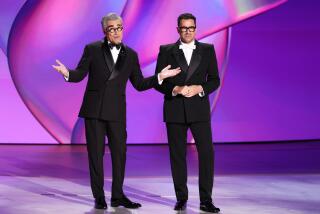EMMY AWARDS--THE LIST JUST KEEPS ON GROWING
- Share via
In the beginning, there were but six winners. Now, after Emmy Awards time, the question is not who won, but who lost.
During Sunday’s Emmy show, awards were made in 29 categories of prime-time television. But 132 other Emmys already had been awarded in three earlier salutes to daytime programs, classical music and dance programs, news, and various craft and technical areas.
It is not over. A fifth Emmy ceremony--for TV sports coverage in the season of 1984-85--will be held early next year, says a spokeswoman for the New York-based National Academy of Television Arts & Sciences, which administers those awards.
All this honoring amply illustrates the growth of television, its forms and on-air hours, and even the number of Emmy Awards given each year since 1948.
A few seasons ago, a TV special, “The Best of Everything” had a sketch that neatly summed up the danger of unbridled honoring. In it, Art Carney was announcing an award. He was interrupted and given an award for the best explanation of an award.
Larry Gelbart, co-producer of the late, oft-honored “MASH,” was involved in the writing of the sketch. Prior to Sunday’s Emmy show, Gelbart, a past Emmy winner, was asked if perhaps there now are just too many Emmy Awards given out.
“No. I don’t think I’ve had my share,” he solemnly insisted. However, reflecting on the larger issue, he said the spread of Emmy-awarding may indicate “kind of a group self-indulgence. We are such an egotistical group that if no one gives us an award, we do it ourselves.”
He also said that he suspects “it’s gotten out of hand.”
Thirty years ago, only 40 awards were handed over, five for categories no longer with us--best male and female singer, best male and female comic, and best specialty act. The last was won by Marcel Marceau, whose specialty was silence.
Ten years later, thanks to heroic efforts, the number still was 40. But by the season of 1974-75, the total number had more than doubled, with 88 Emmys won, according to Emmy records-checkers in New York.
That number may well be doubled when the sports Emmys for 1984-85 finally are announced and added to the total tally for the season.
As in past years, Sunday’s Emmys were for specific categories. But television is a collaborative medium. If you count the number of persons sharing an award, the number of persons who can say he or she is an Emmy winner can rise dramatically.
Some large, if not necessarily typical examples:
--Before Sunday’s festivities, 13 workers on “Late Night Night With David Letterman,” including Letterman, had been nominated to share a writing Emmy.
--Eight persons shared the best-comedy series nomination for “The Cosby Show”: two executive producers, two co-executive producers, a supervising producer, a producer and two co-producers.
--Another eight working in similar capacities on “Miami Vice” shared that show’s nomination as last season’s best dramatic series.
So, 29 persons in three categories were eligible to take home Emmy statues. As things turned out, the Letterman 13 won. So did the Cosby 8. But the “Vice” squad lost to a quartet from “Cagney & Lacey.” This meant only 25 Emmy-sharers in three categories.
Still, the mind may reel, particularly if the mind is old enough to hark back to the original Emmys for the black-and-white television year of 1948.
Then, only six awards were distributed--two for programs; one shared by KTLA personality Judy Dinsdale and her puppet, Judy Splinters; one for KTLA, and one, a technical award, to Charles Mesak of Don Lee Television for his fine work on the phase-finder.
But the sixth award, a special one, might have set the stage for what largely has become an annual back-pat festival in which many are called and many are chosen.
That special 1948 Emmy went to Louis McManus for his “original design of the Emmy.”
More to Read
The complete guide to home viewing
Get Screen Gab for everything about the TV shows and streaming movies everyone’s talking about.
You may occasionally receive promotional content from the Los Angeles Times.






